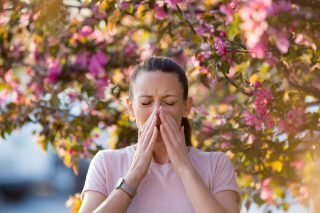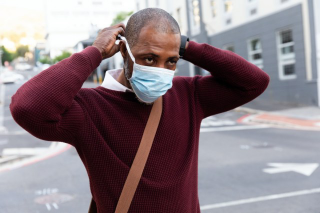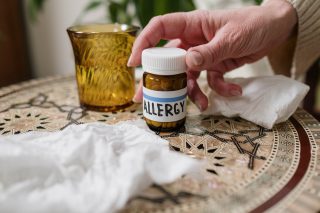With the snow finally melting, the trees budding, and the birds singing also comes the dreaded pollen season. According to a study by the American Academy of Allergy, Asthma & Immunology, about 7.8% of adults in the United States suffer from seasonal allergies known as allergic rhinitis. Here are four tips to arm yourself against pollen.
Allergy Season Survival Guide
1. Stock Up Ahead Of Time
Seasonal allergies can hit anytime, especially as spring approaches. Up your preparedness and utilize an over-the-counter medicine delivery service to fill your medicine cabinet on the go. This way, you are ready before allergy season even hits. You’ll need both antihistamines and decongestants. Both can be taken orally, as eye drops, or as nasal sprays depending on your need. Here’s a quick recap on the differences to help you prepare.

Budimir Jevtic/Shutterstock
Antihistamines
When you come into contact with allergens, your body produces histamines, which causes your nose and throat to swell and your eyes to run. Antihistamines reduce these histamines, which in turn reduces your symptoms. They are best used when you have a runny nose or watery eyes.
Decongestants
Decongestants help fight an already swollen nose or throat by bringing the swelling down. They are best used when you’re congested.
You can also have natural remedies on hand to fight your allergies. Studies have shown that high doses of vitamin C act as a natural antihistamine and help to reduce the symptoms. So be sure to stock up on citrus fruit and fruit juices and find creative ways to incorporate them into your diet before allergy season hits full force.
2. Protect Yourself
While treating allergy symptoms is totally possible, you should also take measures to reduce your exposure to allergens in the first place. This will help to lessen the severity of your symptoms. One easy solution is something you’ve already been doing this past year!
 Wearing a mask can help prevent pollen from being inhaled when outdoors while continuing to act as a barrier against COVID-19. If you use a cloth mask, be sure and wash it every time you use it to prevent pollen buildup. You should also change clothes after being outside and wash outerwear often as well. This way the pollen on your clothes isn’t spread throughout your home.
Wearing a mask can help prevent pollen from being inhaled when outdoors while continuing to act as a barrier against COVID-19. If you use a cloth mask, be sure and wash it every time you use it to prevent pollen buildup. You should also change clothes after being outside and wash outerwear often as well. This way the pollen on your clothes isn’t spread throughout your home.
One more precaution you can take is to wear sunglasses or glasses when you’re outside. This can help deter pollen from getting into your eyes, hopefully preventing the watery and red eyes you’re used to during allergy season.
3. Breathe Clean Air Whenever Possible
While you may crave fresh air after being cooped up inside all winter, it’s actually not in your best interests to be breathing it all the time if you’re allergy-prone. Yes, even if you want to feel the wind in your hair as you drive and blast the country music, avoid rolling down the windows when you’re driving as this allows the pollen to swirl around you.
This year, try keeping your house closed up and run an air conditioner if you want airflow. Avoid using ceiling fans or smaller fans that could spread pollen and dust. If you do use them, be sure to wipe them down regularly. Finally, consider investing in an air purifier to keep the air you breathe in your home clean and filtered.
4. Know The Difference Between COVID-19 and Allergies
Allergies are already a hassle, but when shortness of breath and a cough could be signs of COVID-19, they can be downright scary. The CDC defined symptoms common to each to help distinguish between them.

Photo by cottonbro from Pexels
Symptoms more common of COVID-19
- Fever and chills
- Muscle and body aches
- New loss of taste or smell
- Nausea or vomiting
- Diarrhea
Symptoms common of both
- Cough
- Shortness of breath or difficulty breathing*
- Fatigue
- Headache
- Sore throat
- Congestion or runny nose
Symptoms more common of seasonal allergies
- Itchy or watery eyes
- Sneezing
Hopefully, this helps, but if there is any doubt about whether you have allergies or COVID-19, play it safe and stay home. COVID-19 is still a threat, and we need to continue being careful and protecting those around us. If you want to learn more, here are some more answers to your burning questions about COVID-19 and allergies.
With these tips, you and your family will be equipped to go out and enjoy the sunshine as it comes!





![women [longevity live]](https://longevitylive.com/wp-content/uploads/2020/01/photo-of-women-walking-down-the-street-1116984-100x100.jpg)









